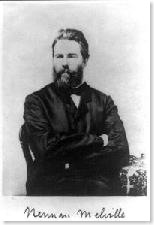Almost Completely Forgotten
"Methinks that what they call my shadow here on earth is my true substance. Methinks that in looking at things spiritual, we are too much like oysters observing the sun through the water, and thinking that thick water the thinnest of air."
~ Herman Melville (Aug. 1, 1819 – Sep. 28, 1891), Moby Dick
From The Writer's Almanac (8/1/08):
...Melville got married and had four children, and the family bought a farm in  Massachusetts, where Melville became friends with Nathaniel Hawthorne. Melville was working on Moby-Dick, his story of Captain Ahab's obsessive hunt for the great white whale, and Hawthorne encouraged him to make the novel an allegory, not just an account of whaling.
Massachusetts, where Melville became friends with Nathaniel Hawthorne. Melville was working on Moby-Dick, his story of Captain Ahab's obsessive hunt for the great white whale, and Hawthorne encouraged him to make the novel an allegory, not just an account of whaling.
Melville became consumed with writing Moby-Dick. He would work all day without eating until evening, and he would bellow across the house, "Give me Vesuvius' crater for an inkstand!" He was elated when he finished his novel (published in 1851) and considered it his greatest work yet. He wrote to Hawthorne, "I have written a wicked book and feel as spotless as the lamb."  But it was a flop. Readers didn't like it. His American publisher only printed 3,000 copies, and most of those never even sold; in 1853, a warehouse fire destroyed the plates and the unsold books, and the publisher refused to reset the book or compensate Melville.
But it was a flop. Readers didn't like it. His American publisher only printed 3,000 copies, and most of those never even sold; in 1853, a warehouse fire destroyed the plates and the unsold books, and the publisher refused to reset the book or compensate Melville.
Melville wrote two more novels just to make money, and he said the experience was like "sawing wood," but he still couldn't make enough to live on. His work became darker and more psychological, and it sold even fewer copies, and Melville began to get depressed. His last major work was The Confidence Man (1857), a biting satire of American life. He wrote poetry but couldn't find a publisher, so he had to publish it himself. He moved to New York and got a job as a customs inspector on the New York docks. The manuscript of his final work, Billy Budd, was found in his desk after he died. At the time of his death, Melville had been almost completely forgotten, and The New York Times called him "Henry Melville" in his obituary. Moby-Dick is now considered one of the great American novels.





